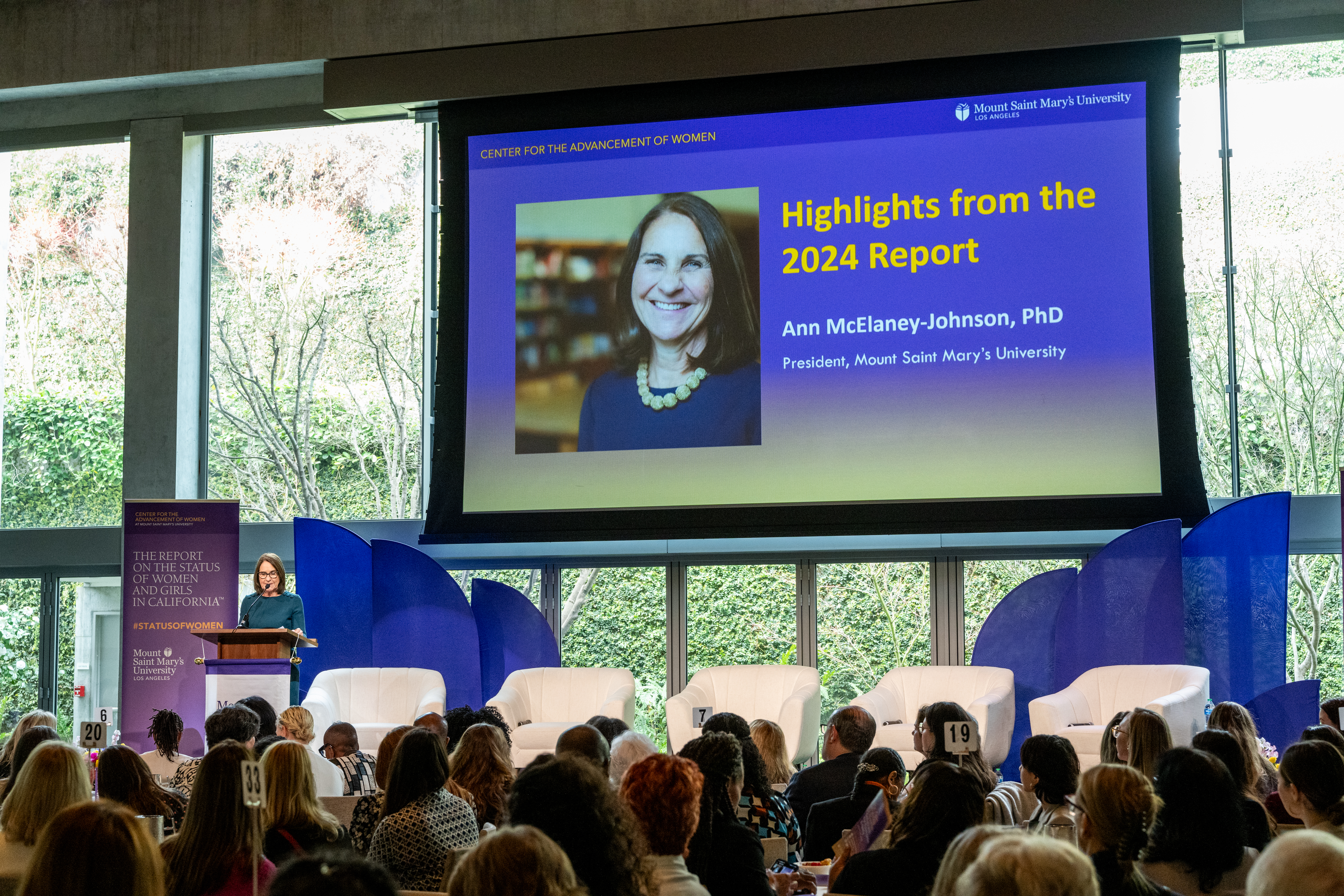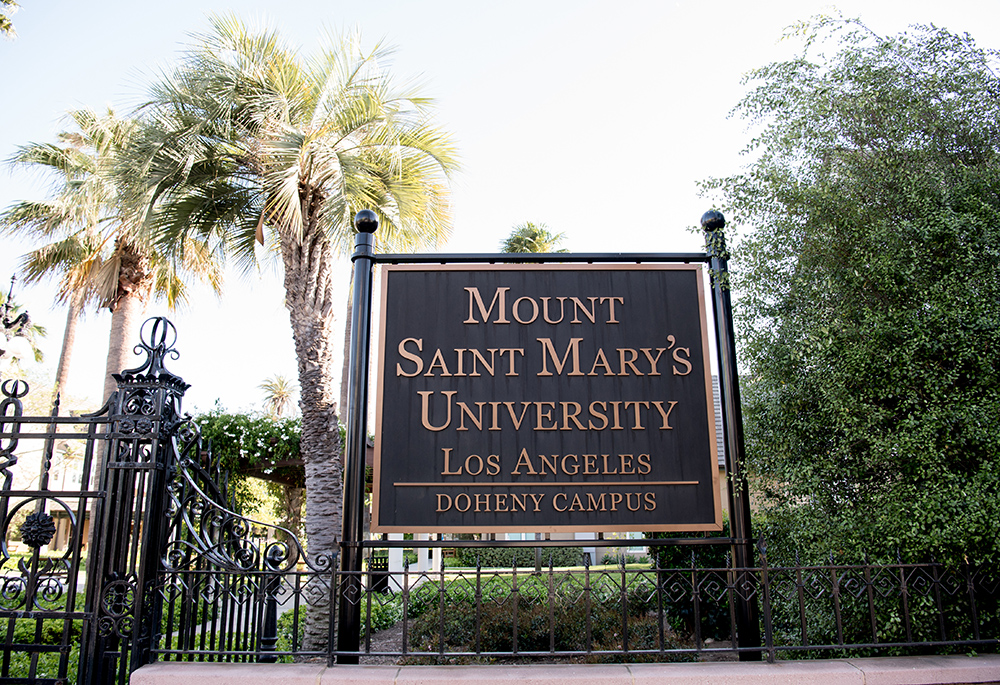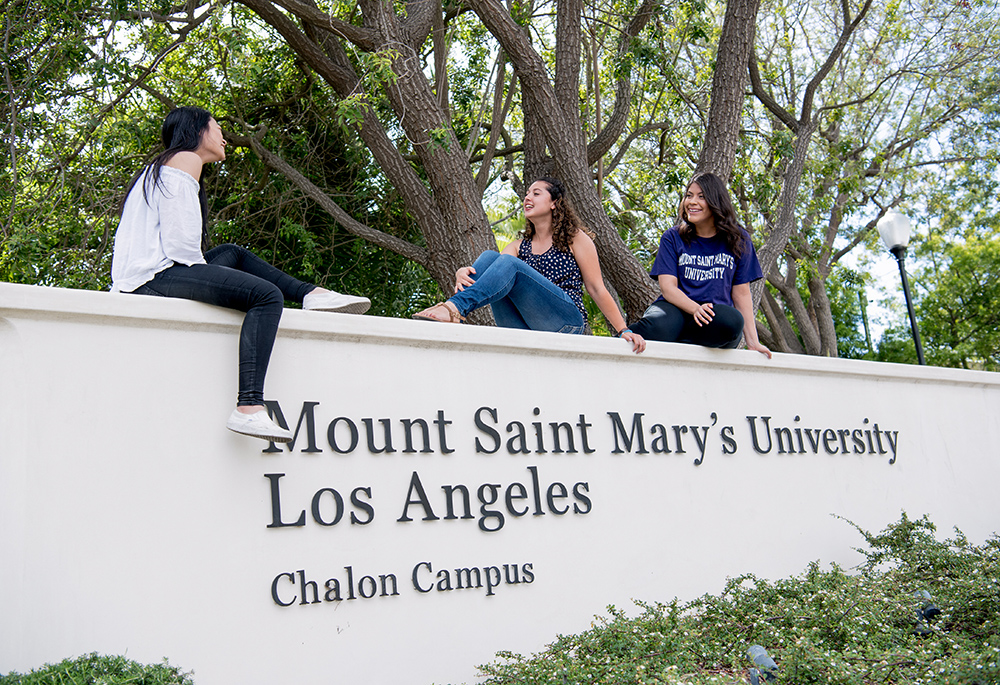
Ann McElaney-Johnson, president of Mount Saint Mary's University, Los Angeles is seen speaking at the Skirball Cultural Center for the release of the 13th edition of "The Report on the Status of Women and Girls in California." (Courtesy of Mount Saint Mary's University, Los Angeles)
A year after Ann McElaney-Johnson was appointed president of Mount Saint Mary's University in Los Angeles in 2011, she oversaw the start of an academic research study called "The Report on the Status of Women and Girls in California."
The findings were announced. The response was a bit muted.
"We weren't known for this work, we put it out there, invited legislators and others in the community, and we didn't really have a big turnout from the public sphere," McElaney-Johnson recalls now. "Within a few years, we had people asking if they could come to our event because it had become an important tool. That's been very heartening."
In March, the 13th edition of the study, a 70-page research project framed as "The Cost of Being A Woman: Advancing Solutions for Economic Equity," drew hundreds to a sold-out public event at the Skirball Cultural Center. Speakers included Gayle Goldin, the deputy director for the Women's Bureau at the U.S. Department of Labor; Los Angeles County supervisor Holly Mitchell; and authors Eve Rodsky and Pooja Lakshmin.
The response reinforced to McElaney-Johnson not only how important it is to annually reevaluate data and process action items, but how the work continues to speak to the principles of the Sisters of St. Joseph of Carondelet. The community came to Los Angeles in 1903 and founded then-Mount Saint Mary's College almost 100 years ago in 1925.

An entrance sign at the Mount Saint Mary's University, Los Angeles campus (Courtesy of Mount Saint Mary's University, Los Angeles)
"This interest we have in equity and justice really comes from our identity as a Catholic university and our Catholic faith," said McElaney-Johnson. "The genesis of this research comes from the sisters' deep faith and deep commitment to bringing those on the margins to the center of social justice. The full experience at Mount Saint Mary's is imbued with those values of Catholic intellectual tradition and Catholic social teaching.
"I think this report comes from that same ethos. We believe that a higher education institution can do the research, get the data and discover where are these gaps that are harmful to California women and girls and families? Where are we lifting up? What are some of those best practices?"
"As a Catholic university we also see that as a role we can play in gathering people from all kinds of different fields and faith groups to think about these issues from a variety of orientations, then to advocate change that will improve the lives of Californians," she said.
Mount Saint Mary's, the only all-women's Catholic university in Los Angeles, has about 2,400 students on campuses in Brentwood and near the University of Southern California, south of downtown L.A. Nearly 70% of students are eligible for federal Pell Grant student aid, and 62% are first-generation college students. The demographic is nearly 60% Hispanic, 15% Asian, 10% white and 6% African American.

Students at Mount Saint Mary's University, Los Angeles seen at the entry sign on campus (Courtesy of Mount Saint Mary's University, Los Angeles)
This year's project, again spearheaded by the university's Center for the Advancement of Women, zeroed in on findings that started from the recurring theme that not only do white and Asian American women earn about 80 cents on the dollar compared to white men, but African American women are at 57% and Latinas are at 45%.
The domino effect, as the study revealed, is that women nationwide save less than 50% of what men save annually, and they have less than two-thirds the amount of retirement investment men have accrued. They also pay 30% more out of pocket for medical expenses, and more often delay care for their own medical needs. Add to that: more than 70% of single women in California who run households say they do not earn enough income to meet basic needs.
"As a Catholic, quite honestly, and as a person who cares about my community, that raises an alarm," said McElaney-Johnson.
On a positive side, California remains first in the country for women-owned businesses, employing some 2.6 million. There is also more legislation to address what has been called the "pink tax," a reality where women had been paying some $2,400 a year more for the same household products as men. In 2022, the California Commission on the Status of Women and Girls helped generate policy change with a new state law.
Advertisement
McElaney-Johnson also notes that, no matter what the numbers say year after year, change usually continues to come at a slow pace.
"That can be discouraging, but it emboldens us as a people of hope," she said. "I am an optimist by nature and believe if we keep bringing more people into the conversations in solidarity, we will find solutions. One of the Sisters of St. Joseph once told me: 'We don't define ourselves Catholic by whom we welcome, it's by how we welcome.' They have a real concept of radical hospitality and including everyone in on this. Those who go to the report can see what's personally important to them, and how they work with these social agents in their parish or in their business.
"Where we haven't seen progress quite honestly is what we have to continue working for," she said. "We can't give up on it. We really do persist."






